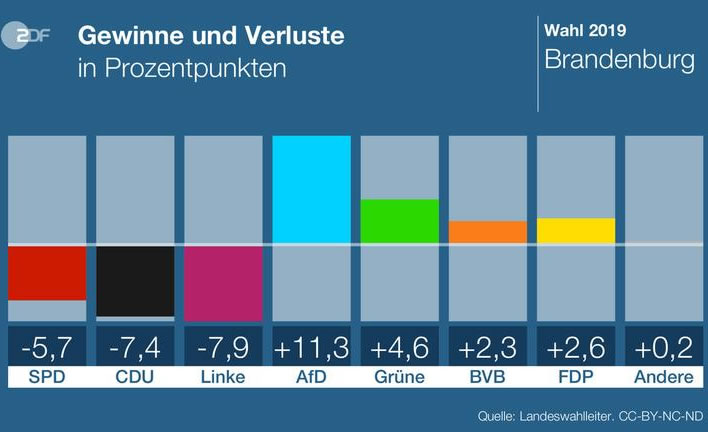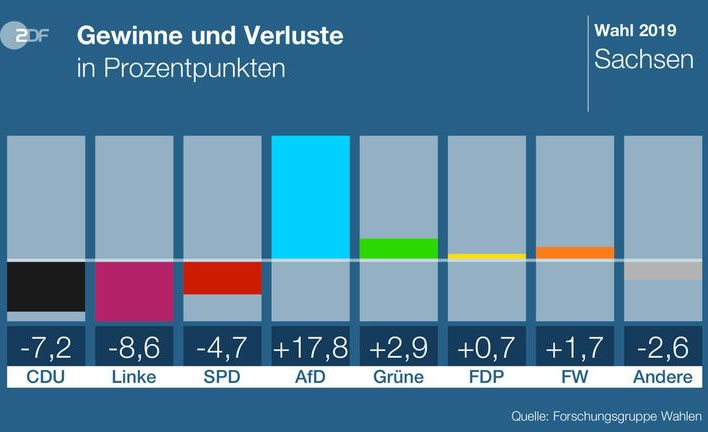No change in Sachsen and Brandenburg
Richard Law, UTC 2019-09-02 14:18
With the results of yesterday's elections in the German states of Sachsen and Brandenburg, the Figures of Speech First Law of German Politics, 'Nothing Ever Really Changes', has received further validation. Mockers and grumblers will have to continue to gnaw at their knuckles whilst they wait and hope for further ages for its falsification.
Desperate for headlines, media outlets outside Germany grasp at the 'success' of the Alternative für Deutschland (AfD) party in order to serve up some variant of the old, thin boiler-fowl broth, 'right-wing landslide in the east', now tasteless and over-salted from reheating. It is almost impossible these days to get sensible, balanced reporting in the mainstream German media, so rabidly do they all hate the AfD. Since the mainstream media in the rest of the world copies off the mainstream media in Germany, that's everyone done for, in effect.
The pieces written by the Berlin bureau of the Swiss Neue Zürcher Zeitung (NZZ) are generally much saner – it's easy to be calm and rational about a country when it is not your own. There are occasional moments when they too clutch their pearls with shock, but such moments are quite rare.
One of the NZZ Berlin team, the usually reliable Benedict Neff, says all that needs to be said in the first paragraph of his commentary on the election:
Where is power? If you just wanted to evaluate the state parliament elections in terms of this question, then the CDU and the SPD came out of it quite well. According to the provisional forecasts, Brandenburg will continue to have an SPD Prime Minister and Sachsen a CDU Prime Minister, as has been the case for the last 29 years. Thus the latest elections results do not rock the Great Coalition in Berlin in the slightest. One could say: everything goes on as before. Even the government coalitions in Sachsen and Brandenburg will be less imaginative than expected – the CDU has been saved having to have an association with the leftwing party.
Wo ist die Macht? Wenn man die Landtagswahlen in Sachsen und Brandenburg nur anhand dieser Frage beurteilen wollte, kämen die CDU und die SPD noch gut weg. Laut den Hochrechnungen dürfte Brandenburg weiterhin einen SPD-Ministerpräsidenten haben und Sachsen einen CDU-Ministerpräsidenten – wie schon in den vergangenen 29 Jahren. Damit bringen die jüngsten Wahlergebnisse auch die grosse Koalition in Berlin kein bisschen ins Wanken. Man könnte sagen: Alles geht weiter wie bisher. Selbst die Regierungskoalitionen in Sachsen und Brandenburg werden weniger phantasievoll als erwartet – eine Verbindung mit der Linkspartei bleibt der CDU wohl erspart.
NZZ
That should have been it, but unfortunately, scribbling at ten o'clock in the evening on election day, the poor chap Neff is required to tap out another five hundred words or so. It is not long before the old media desperation strikes, the magisterial calm evaporates and he is reduced to the old formula:
On the whole in Sachsen and Brandenburg a landslide to the right has taken place.
Insgesamt hat in Sachsen und Brandenburg ein Rechtsrutsch stattgefunden.
Insgesamt, 'on the whole' indeed! Chicken broth, anyone? More precise would have been im engsten Sinne, 'in the narrowest sense'.
Considering that it has only existed for a few years, the AfD did indeed make extraordinary gains in the two states. But these gains make no difference at all because the First Law of German Politics, 'Nothing Ever Really Changes', is built into the constitution.
Since the foundation of the Bundesrepublik Deutschland in 1949 its provisional Grundgesetz, 'Basic Law', later its final Verfassung, 'Constitution', has provided a political basis that is as unmoveable as any German Chancellor's well-padded bottom (Merkel included) on a well-padded German Chancellor's chair. We have pointed out on a previous occasion the symbolic character of the spatchcocked 'fat hen' masquerading as the German eagle which looks down on the proceedings in the German parliament.
The two substantial parties in Germany, the Volksparteien, the 'People's Parties' of the CDU/CSU and SPD have vowed never to enter into a coalition with the AfD. Ditto nearly all of the small parties. 'Never say never', but even with the glorious inducements of influence and money that political power brings in Germany, there are not enough hats in the country that would have to be eaten to permit a coalition to be formed with the AfD.
The AfD is the only party that offers an alternative – the clue is in the name – to the current softy-lefty course of German politics, a course that is capable of embracing most of the German parties, all except, that is, the AfD. Whether that alternative is to your taste is not the point at the moment. If no other party will share power with it, the only way that the AfD will change anything at all is by winning an absolute majority (51 percent for the non-numerate) in a federal election and absolute majorities in a majority of the sixteen state governments that make up the federation.
The position of the AfD as the strongest opposition party in parliament gives it certain rights and opportunities – the right to respond first, first choice of the sandwiches in the canteen etc. – but no power whatsoever. Even if it were the largest party and could try to form a coalition, there is no party that is ideologically aligned with it or willing even to speak to it.
The only potential change that has occurred in German politics is the success of the Greens and their new role as a cuckoo in the nest of coalitions that now have to be formed as a result of the weakness of the two major parties. Since both of these parties have slid into green thinking all on their own, bringing the Greens into their coalition makes little difference on the whole and the First Law of German Politics still holds.
The end result is a Nullpolitik, a politics of stasis and convenience. The unrest and the demand for a change of direction that the AfD represents will continue to go unheard politically. The longer the established parties continue shamelessly to make artificial coalitions just to keep themselves in power, the more successful the AfD will become. Whether it will ever become successful enough is an open question. Certainly, the First Law of German Politics tells us 'no'.
If readers have the determination to ponder the forensic details of the results for themselves they can be found here in a very comprehensive form for Brandenburg and Sachsen.
The headlines and tone of the reports are typical for German mainstream media. Video interviews with representatives of the CDU and SPD, none with the AfD. Reporters look at the following charts and write about the single-digit losses of the CDU and SPD, preferably making no mention of the double-digit gains the AfD made:

Brandenburg: percentage losses and gains.
Images: ZDF / Forschungsgruppe Wahlen

Sachsen: percentage losses and gains.
Images: ZDF / Forschungsgruppe Wahlen
That First Law of German Politics, 'Nothing Ever Really Changes', is still valid and will remain so for the foreseeable future.
0 Comments UTC Loaded:
Input rules for comments: No HTML, no images. Comments can be nested to a depth of eight. Surround a long quotation with curly braces: {blockquote}. Well-formed URLs will be rendered as links automatically. Do not click on links unless you are confident that they are safe. You have been warned!